#literally invoking the gods as i speak
Explore tagged Tumblr posts
Text
*insert Helly invoking the wrath of that humanizing Anon bc he has nothing else to do and none of his alternate selves would let him on the humanity opportunity*
FIGHT ME ANON >:)
#helly's thoughts of the day!#what the fuck fr#yes he just wanna reign into the chaos of broomstown (even if this isn't exactly...his)#while the rest of the BRT gets into angsty shenanigans or chill#robocar poli#literally invoking the gods as i speak#and by 'gods' i mean anons#gog help this poor lad#not that god can do so
4 notes
·
View notes
Text
I so seldom post because I get shy (hence why I ramble so deeply in tags... I have so many thoughts but so little backbone). BUT I've been reading Batman and Robin (2009) aka Dick and Damian's Batman and Robin run, and my GOD. I came across a page from when Bruce finally returns from being lost in time, that was just BEGGING to be used in a web weaving post. I think I have to make it, I really do. Oh Brucie Baby, oh "What Resembles the Grave But Isn't" by Anne Boyer, we're really in it now
#like i saw doctor hurt aka thomas wayne (but not THAT thomas wayne a thomas wayne from like 1700) talking abt holes and OH GOD#'im your father! my mentally ill son- i made this hole that you'll never stop falling into!' oh my GOD#i literally was like 'HAS ANYONE DONE THE HOLE WHICH RESEMBLES THE GRAVE JUXTAPOSED W THIS?? HOW HAS NO ONE DONE THAT?'#tho mb someone has already lmao#like the metaphor that this thomas is NOT bruce wayne's father. but is what he is saying untrue to bruce's father in a metaphorical sense?#like... not thinking of how doctor hurt created a hole bruce fell into. but thinking abt how mb his father did inadvertently by dying?#with that hole being like. ALL of this. bruce as batman. the never ending mission#as dr. hurt speaks he invokes a language that forces juxtaposition to the REAL thomas. which makes us realize a truth abt the real thomas#because when we consider his words and consider the REAL thomas. we realize that those words (in a diff context) apply to bruce's father to#and THAT. is fucking. just. OOOOOF like omg it's so much#batman and robin (2009)#batman and robin#thomas wayne#doctor hurt#idrk how to tag that man im ngl...#tagging just thomas wayne here works tho bc like it ISSSS abt THAT thomas and bruce as much as it is abt doctor hurt and bruce#bruce wayne#mine#meta
2 notes
·
View notes
Text
this but w jackson!ellie ☆.

✮ — ellie would have your legs draped, chest plumb to her bicep, and ears nonstop soaking in her raspy voice swooning over every fry and crack her throat falls into. she reads aloud one of her favorite savage starlight issue— cause you let her. want her to. crave that steady song, the thrall her peeking teeth and pink tongue let vibrate upon the mellow air. cute freckles dancing upon her cheek as she mouths every word, has your heart awakening, unfolding a pulse that is your little bud of love. lighting up the mind— ellie's snuck in chuckles and awkwardly timed comments would invoke, "that's when dr. daniella star deftly swiped his laser gun and– god babe, these pants are so soft, why don't you wear them more often?" like, els' can get consumed by a distracting texture or just feeling in general the moment she runs her calloused fingertips over the forgiving landscape of your thigh, bending at the center knuckles she gropes and plays with the chub there�� but goddess, does she adore silkenlike materials and kisses of cotton. always instincts her brain to wanna ghost her fingers under all the way to your ankle and press a hot thumbprint to the concave of your underfoot. stows that comic on the heaped book pile perched atop the coffee table and zeros in overall manner of attention and regard to you, "feet swollen from patrol? mhh, i gotchu'," swears she can detect the throbbing your feet strummed when her hands bare and cradiling swathe one up, "graduated from master massager university, ur' in good hands babe. literally." such a fucking dork. you curve ball a flat, "i don't see a degree anywhere els." at her n' she just knits her browline at you, tutting low prior to speaking, "don't need it— look, m' a fucking pro." while her fingers force your foot up into her circling thumbs, palpating around the big knuckles. needless to say, it was fire.🔥
i'll be fr ellie giving me a foot massage w get me hard
#ellie williams#ellie williams fluff#ellie williams x reader#ellie tlou#⊱🦷.•aestra talks#⤹𓍢ִ໋aestras thoughts#lesbian#sapphic#ellie x reader#ellie williams x fem!reader#ellie williams fic#ellie williams fanfic#ellie williams fanfiction#ellie williams blurb#ellie williams drabble#ellie williams concept#jackson!ellie
475 notes
·
View notes
Text





Julia Fox
She is a Shravana Sun (gifted) truly, much like Billie Eilish. You can see it in the eyes, that psychic, 'weirdo', 'rejected' 'freak' kid. She talks a lot in her book about feeling 'different' from everyone else, unique and strange. With Shravana natives, we see the gifted child (Harry Potter vibes)
Her Bharani Moon gives her a seductive, hypnotic, sultry, Venusian beauty. She loves fashion, like a typical Venusian, and has a hedonistic, intense, extremist side. We know she was a Dominatrix in her young adult life, which is perfectly in line with sensual Bharani Nakshatra (it's symbol being the literal Yoni)
Her Mercury is in Purva Ashadha, and she does have a very soft, beautiful writing (and speaking) style. Mercury rules over how we speak, write, communicate and think, her mind is beautiful really, and so is her speech.

I can definitely see her sensual Bharani Moon in a lot of photos of her online; lollipops, sugar, ice cream. Venus (Shukra) is oozing out of every pore in her body. She does give off a very seductive energy, and has an intoxicating, Aphrodite-like aura.

Bharani is ruled by Yama, The God of Death, and she does talk a lot in her book about sewersidel thoughts. She overdosed twice. She almost died, she's definitely 'tasted' death. This is in line with Vedic Mythology. This is directly from her book: "My new friends and I hold séances in my bedroom, invoking the spirit of the deceased front man of my favorite band, Nirvana. I tape a picture of Kurt Cobain on my wall and fantasize about dying so I can join him on the other side. “It’s better to burn out than to fade away,” he wrote in his suicide note." -Julia Fox
Her Ascendant is in Ardra Nakshatra (ruled by Rudra, The Storm God, and The Tear Drop), she's lived an extremely traumatic and tumultuous life. She does have a bit of Taylor Swift energy though (Also Ardra influenced), whereby she constantly mentions 'not needing men', and is a radical feminist). Ardra Nakshatra is also very into fashion, due to Rahu here creating obsession and craving, a touch of materialism. (Peep the black and white Fabric - Coco Chanel vibes and the leopard print too!) From her book: "The faces on the missing posters stare blankly back at me. There are so many all stacked on top of one another, each telling a devastating story. At night, I lie in bed and wonder if every plane I hear flying overhead is actually a bomb. I grip my pillow over my ears and brace for impact."



In my humble opinion, she is extremely iconic, and still too underrated. I believe she will continue to grow further into her fame - she's got a very socialite 11th House Moon, (fame, friendships and the spotlight).
Her life purpose (Rahu) is in Shravana (The Moon); a huge part of her destiny in this lifetime was to become a mother. Chandra = Mother / Moon. We know that she writes and talks a lot about her son, and how he changed her entire life and is now her whole world.

A lot of Moon influenced women, Venususians and Rahu girls will fall in love with and greatly look up to Julia Fox. (Shravana + Bharani, Purva Phalguni) as well as many Ardra Natives. Gen Z in particular, I can see a ton of women with those placements feeling inspired by her, feeling like her story is home to them, feeling like they understand her, and she understands them.
Overall, I love Julia Fox and her energy, and just wanted to share this with you all. As a Bharani Sun woman myself, I feel so close to her energetically and spiritually (and I'm sure many of you out there do too!)
#juliafox#downthedrain#kanyewest#vedicastrology#astronotes#astroanalysis#chartanalysis#venus#bharani#shravana
60 notes
·
View notes
Text
He Who Was Called Mammon's Son - Day 1
Not a summary. Just random babbling about the event. I'm not saying anything official or even necessarily answering questions I bring up/pose. I just want to go off. Before I start... LOOK AT BABY MAMMON! He's so tiny! OMG! I cannot handle it!
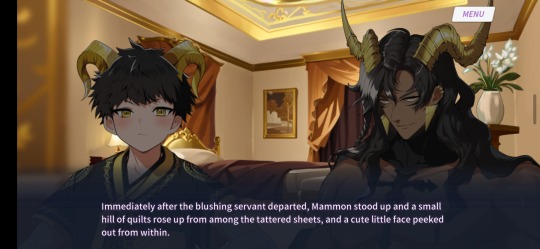
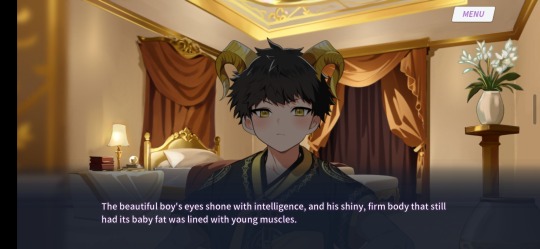
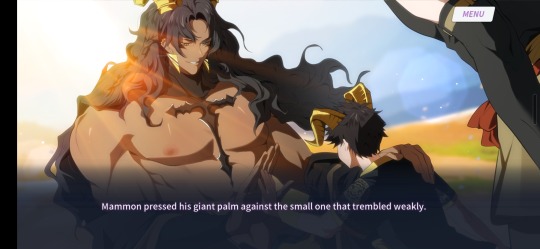
Shall we start with the fact the Papa Mammon is fine as hell and is described like poetry? The man is beautiful and is so pure in his motives to protect and love his kingdom...
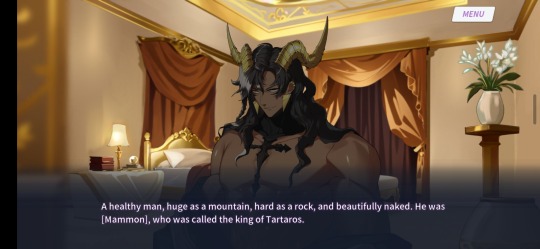
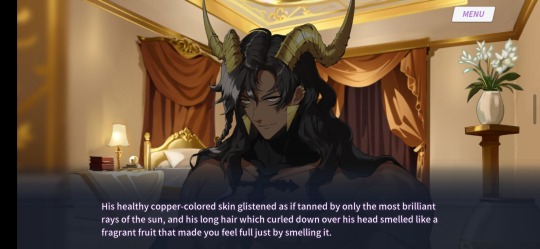
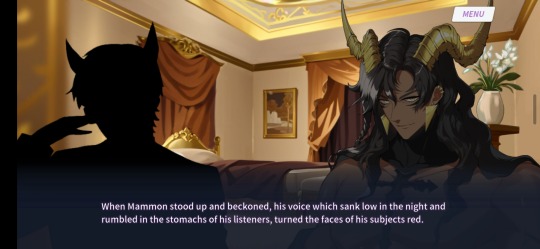
He's going to die. Sorry. But we all know he is going to be dead by the end of this event, right? This is the exact kind of event where they kill of a beloved parent in order to motivate the protagonist (Baby Mammon). They even evoked the Lion King by pulling that hilltop scene so Baby Mammon could understand the gravity of what he is about to inherit.
The difference is that Baby Mammon and Papa Mammon face their greed differently. They are both intrinsically led by the desire to protect and to have. Papa Mammon is mature enough to see the kingdom as his family and that he must keep it safe. Baby Mammon sees that Tartaros does not cover the entirety of Hell yet, so he must have more of it... so that he is able to protect more of Hell -- living and dead.
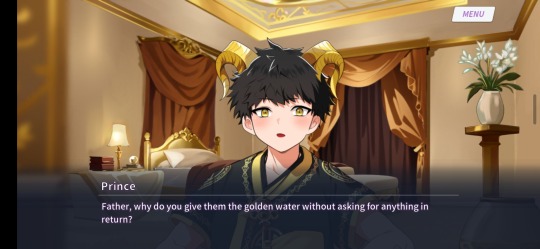
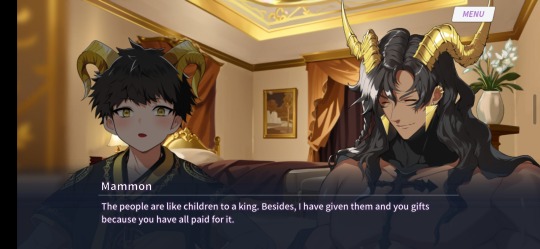
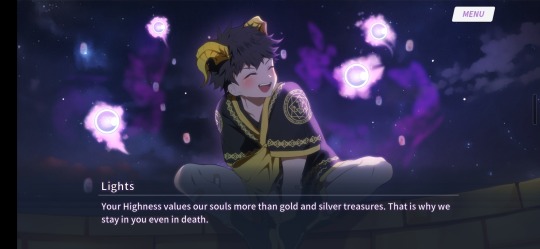
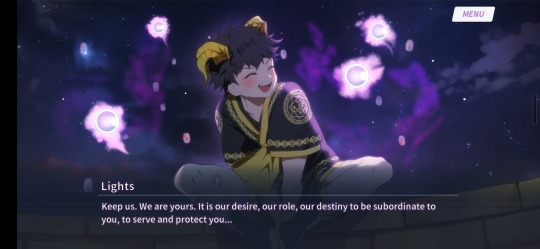
Even Papa Mammon recognizes Baby Mammon is greedier than he is in a way he he never could have imagined, making him the true king of Tartaros (which also means that kings are placeholders until the true one shows up).
*Side note: Are these technically names or titles? Papa Mammon is the king, but Baby Mammon hasn't gotten a name yet, I guess. He's just the Prince. Baby Bimet may not be Bimet either yet. I wonder if, in Tartaros, certains names are titles rather than birth names? Maybe that is true of multiple kingdoms. IDK because Amon was born with his name as far as I can tell, and he's the only devil we've seen before he became one of the 72. Well... Technically Leviathan and Orias too, but they were literally given numbers when they were prisoners of Heaven.
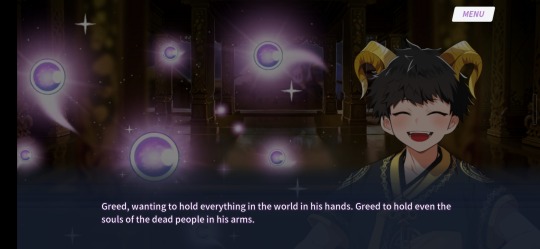
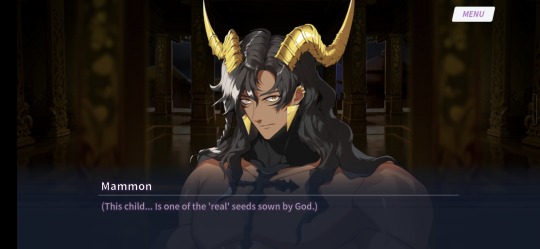
Baby Mammon is so adorable! He is a little puppy who needs extra care and attention because his body is so weak. However, this does raise the question of who is responsible for the underground lab in Tartaros. After all, I doubt Papa Mammon didn't know they were doing such experiments in his own land. The question is if he allowed it, ignored it, or... if it started after he was no longer around.
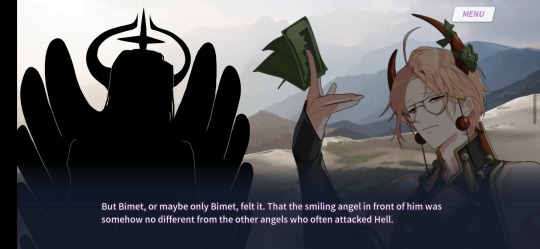
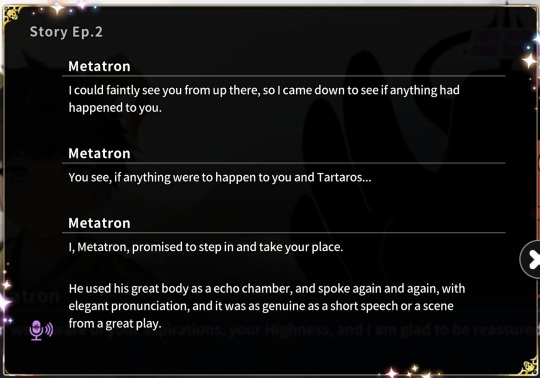
I wish, genuinely, that devils were able to distrust the way Older Bimet seems to. I can just feel how much heartache is about to happen because of Papa Mammon not sensing how malicious Metatron is. This is a clear example of double-speak. Metatron is making it clear that he shall kill Papa Mammon and take everything from him.
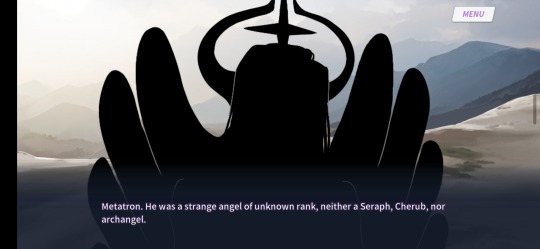
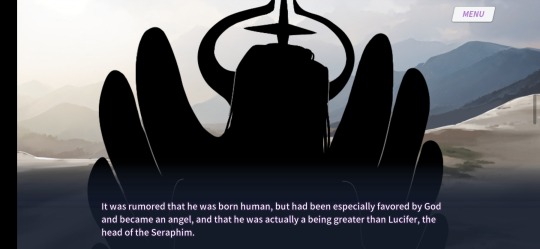
I think identifying that Metatron is (possibly) a former human is important. Humans can lie, deceive, and distrust like angels, but are also capable of acting within their own self-interests like devils. Metatron being a former human, not an angel created by God, would give him the drive, ability, and now power to covet and take for his own self-gain rather than invoking God's name. It also means we can't blame shitty programming for what he may or may not do like we can the other angels who were created with a one-track mind.
Valefor and Eligos are OLDER devils. They were clearly adults when Baby Mammon was still young. Guess that means we can add them to the list of devils who are definitely older than the kings (right next to Gusion).
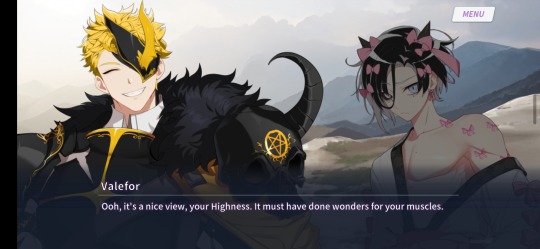
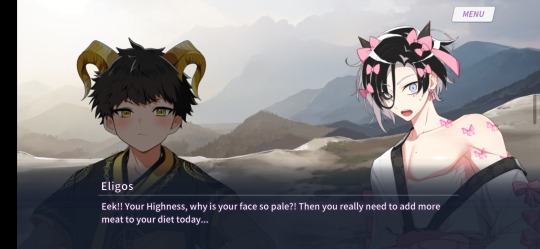
46 notes
·
View notes
Text
was sweeping up some map completion for a gift of exploration and just got reminded of so many cool things I like about original gw2/worldbuilding
I love Orr and how weird and alien it is. The ambience of sitting there with everything damp, dripping, made of coral, literally a lost world that doesn't fit above water any more. I love how oily the sky is and that occasionally a huge shadow sweeps over you as something like Blightghast/other risen dragons go by overhead. I love that it looks like this

It's so otherworldly. I especially like the eerie birdcalls (I know it's just a real bird I'm not used to, but it's so unique and strange)
I like that the end of the Pact storyline doesn't feel... hopeful. At all. Orr is blighted and diseased, mottled with decay, with lost journals from people who were never going to survive. I like that the story culminates here, grandiose but mournful. You're trying again but this place you're in was already lost, with thousands of lives, and it doesn't feel like triumphant reclaiming. I like that none of the game through these >10 years has really framed oncoming war, and fighting to survive, with glory. I like that the fight through Orr doesn't really feel righteous. It's no clash against a tyrant or something with belief in good over 'evil'. It's just sad. Trying to get through and survive it.
I like the clearly LOTR-emulating Orr music, particularly how this one goes into a male chorus at the end-
youtube
I like how an entire map is called Malchor's Leap and that clues you in to it being named after something and then you can go find out and it's just even more depressing. But at the same time, it reiterates the history of Orr - that human gods lived there and it must have been full of incredible splendour and that's gone and you will never see it, you can only try to imagine based on the wrecks of cathedrals.
And speaking of the human gods, I just like how each race has their own take on religion and they all get something tailored to their outlook. Nobody disputes one religion over the other like in our world - each one is generally assumed to be true on some level, and in some cases, provably real, but each race gets something different from their history and belief system anyway. Humans used to live alongside their gods but have been abandoned and none of them know why (and we eventually do find out what happened). Norn can invoke a governing spirit from any creature alive and choose the one that they'll serve best, but these spirits can be killed and you can see what happens when they mourn them. Sylvari have a stone of commandments from their long-dead benefactor that has completely fucked up their society because they aren't sure if following the tenets is wise or brainwashing. Asura actually believe there is an equation that can solve the entire universe and everything is part of a grand scheme beyond knowing, which is something more like a philosophy than religion but deserves mentioning because it means the Intellectual Goblin Race weren't made into cut and dry atheists as a cliche. They believe in something and have personal interpretations about it. One of them even made a machine to make the Eternal Alchemy viewable that drove someone insane when they used it and I just like how things asura do tend to backfire.
And the Charr. I mean. They're the atheists and it's all because they were duped into technically following a human god for a while and they're never going to get over-- no, wait. They started getting over it and the Flame Legion integrated with regular society again after their leader was deposed, because things moved forward and changed, and I like that too.
I feel like I can talk and talk on and on about this fictional history because it... just.... works? It's all part of a tapestry of cause and effect and meaningful characterisations. And they deliberately set up the basis for their playable races and then made the story NPCs generally turn those expectations around - Caithe being a grief-ridden assassin, Rox being a superstitious oddball, Zojja being irrational, Canach starting out as a pompous asshole.
I like the Ceera is still around in HoT and if you took the personal story route where her husband died, she still hasn't forgiven you and never does.
I loved Zafirah (bring her back!) showing that badly rooted spirituality can be redirected into something healthy and healing without being negated.
I like how many NPCs show up as part of a story step and you can ask if you know them and they'll say oh, yeah I was in the Pact with that whole thing? Or 'I saw you from a medical tent in maguuma and didn't think I'd make it', constant callbacks and the sense that minor characters have a continuous existence independent of you.
I like how solemnly the game takes its wins. The initial campaign against Zhaitan makes sure to kill characters off and made bringing Destiny's Edge along to it feel like its own entire obstacle. Heart of Thorns smashes any confidence the Pact has after the base game and takes an intentional sacrifice to be won, and I still think about him. Going after a literal god in Path of Fire costs you your life. Going after Kralkatorrik, with Destiny's Edge's guilt weighing on you, costs you your own child. Saving the fate of the world by fulfilling the exact conditions for Aurene to ascend costs you your child again, being taken from you so that the whole world stops rocking on its axis, losing your baby as she turns into a deity. Icebrood Saga puts you in the shoes of a relatable, easygoing crew on the opposing side, then sits back and waits for you to kill them all to continue. When you fight the final dragon as the final boss in Dragon's End you don't want to kill her at all, and she begs you to leave and get away so she won't harm you while you try, in bitterness and desperation, to end her unfathomably long life.
And the entire short but brilliant arc with Joko made sure we don't really feel empowered or just about the choices we've made.
It's just. Been really fucking good.
222 notes
·
View notes
Text
Watching "Why Do You Always Kill Gods in JPRGs?" and I am in awe of the stupidity on display.
>45 minutes of rudimentary Japanese/eastern history in broad strokes > glosses over the fact that Japan has basic capitalistic free trade and business for its entire history >no, fucking seriously, Japan had industry, independently owned businesses, the general free exchange of goods and services... otherwise known as capitalism. >Japan underwent a post-war economic boom >Some people get very rich and powerful during this boom primarily due to controlling the banking system with backing from a corrupt government >"Their new religion was... CAPITALISM." (paraphrased) >youtube essayist proceeds to explain at length the ways that forcibly aligning culture, religion, and government with private corporate interests is a bad thing (which it is, but it's not capitalism) >... but still constantly invokes "Capitalism" being forced on Japan from the West ("The False God") as the true evil in this narrative >Points to various examples in games where the bad guy is literally just the government and politicians, corrupt megacorps, giant evil monsters, and/or overt oppressive authoritarianism and tries to frame them as symbolic representations of western culture and Capitalism (spoken of as an evil ideology that makes people evil) >At no point do any of these stories (FF7, Persona 5, Chrono Trigger, Earthbound, etc) present the idea that anyone except the already corrupt and evil are in favor of oppressing/destroying/enslaving all humanity and the planet in the name of endless economic growth and power for power's sake. >Several examples are literally evil entities that demand destruction for the sake of destruction and say as much directly >essayist's explanation for why none of this seems obvious and so far detached from the far more clear messages in their stories is because Japan speaks in deep contextual code so as not to offend anyone >aka, essayist gets to assert his beliefs and you can't tell him he's wrong because you just don't get the triple-secret encoded message hidden under all the deep cultural context clues that only a true Japanese audience (or foreign weeb, apparently) would understand >his western examples of Capitalist metaphor are the Outer Worlds and Bioshock Infinite... games where corporatism and an overt pseudo-religious authoritarian are the villains >this guy is a goddamned lawyer, apparently.
This is so fucking stupid. I should have checked out the moment I detected that hint of venom when he named capitalism as the culprit, but morbid curiosity got the better of me. For a bit there, when he was talking about the economic bubble and the lost decade, it seemed like maybe he wasn't going to be totally retarded, but he sure proved me wrong.
The message behind the JRPG genre is often that protecting the world is good, amassing power for the sake of power is bad, and that with the power of friendship and grinding side quests, a ragtag gang of spunky kids can save the world from malicious extraterrestrial entities that aim to mindlessly consume.
And also that the SMT series and many other pieces of Japanese media invokes western religious iconography, names, and symbols because it sounds cool and mysterious to Japanese audiences. That's literally the direct explanation given by nearly every single game and anime writer when asked about all the obtuse and confusing mythology and symbolism in their games.
140 notes
·
View notes
Note
dude i fucking love your series so much, every time you post i get so excited i love learning even more about the demons in smt rahhhhh. anyways can you do lilith? i love like loveeeee her new design in vengeance and think she looks so cool :3.
Lilith - Day 76
Race: Night/Qadištu
Arcana: Devil
Alignment: Neutral-Chaos
July 22nd, 2024
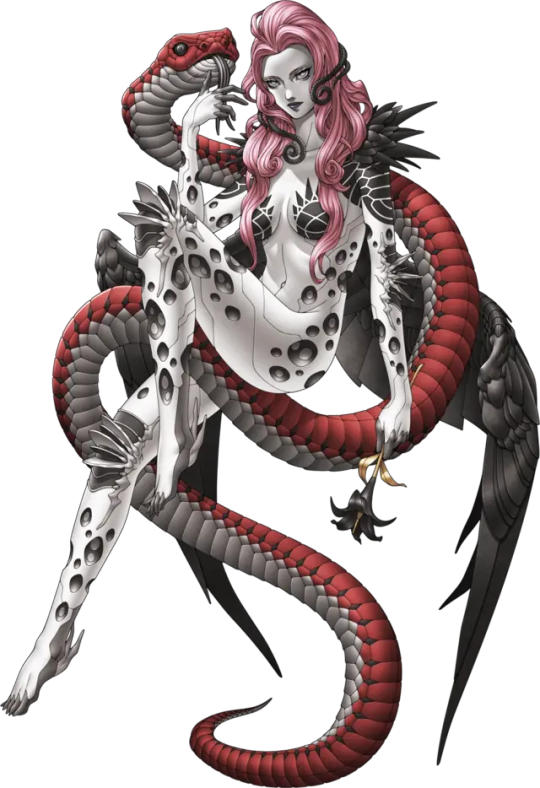
Abrahamic mythology has a lot of rather infamous figures who lay on the more... 'evil' side of things, so to speak. Of course, we have demons like none other than Lucifer himself, to the demons of the Ars Goetia, to even more morally gray figures like Mastema. However, a character that is among the most interesting (and confusing) in the several variations of Abrahamic myth has to be Adam's first wife, a woman who refused to be subservient to her husband- the powerful turned-demon, Lilith.
First off, I just wanna say that I ADORE her redesign as a Qadištu in Vengeance. As someone who just started playing Vengeance for the first time, I love all of the Qadištu almost equally, but Lilith's redesign hits incredibly hard for someone who was already a massive fan of her original design. Her joining this quartet of demonesses is an incredibly nice idea, and I'm, again, a major fan of her redesign. Even though all of the Qadištu originate from Abrahamic mythology, Lilith is a notably obvious example, though of course, this isn't the only design she's had throughout the series. She's had several redesigns, being one of the most recurring demons throughout the series- whether it be her full tits-out design in SMT I, to the most recurring design, her classic look originating from the Playstation port of SMT I, to even her incredibly alien design in SMT IV. Of course, like a lot of recurring demons, she's also one of the most iconic figures in Abrahamic mythology, so why don't we get into that?
Lilith's existence is somewhat contested in scholarly circles, being never actually mentioned in most translations of the Bible- in the original text, Lilith is used as a word for 'creature of the night,' literally translated to 'Night Monster,' though some translations also translate it as screech owl. Most knowledge of her as Adam's first wife appears to be based on extrapolations, as well as what can be seen almost as a plot hole in the Book of Genesis, as two differing creation myths seem to connect back to the idea that there was an 'Eve before Eve,' or 'first Eve.' In the story, while God was presenting animals to Adam, it's said that he may have presented another human to him due to contradictory accounts of the biblical text. This seems to be where Lilith comes into the Bible, being commonly believed to be a woman who refused to submit to Adam, and as such, left the Garden of Eden after failing to satisfy Adam and believing herself to be equal to him. This led to Eve coming into being, a subservient being to Adam. Don't look at me, sexism was just... a thing back in the day.
After her escape, Lilith bore several children, though she was threatened by an angel that they would kill those children. After said children were, well, slaughtered, she grew furious and began to birth demon children known as Lilim... who probably deserve their own spotlight somewhere down the line. It turns out that the demons who began to replace her children were powerful enough to go toe-to-toe with the angels, and joined the demonic ranks somewhere down the line... I think. As revenge on top of this, Lilith also began to ruthlessly target children, apparently being responsible for stillbirths, and if one wasn't to circumcise their child if they were born a boy, she would invoke her wrath unto them as well. How? I dunno! But I guess that's why people are circumcised. How do these always eventually come back to screwing with the genitals? Whatever.
However, where Lilith herself came from is actually an ancient Sumerian text, where she's depicted as a succubus and demoness who first appears in the text 'Gilgamesh and the Huluppu Tree.' In the text, she appears as a demon who builds a house in the domain of a goddess of eroticism, right under the titular Huluppu tree. Gilgamesh, a grand hero depicted in many Abrahamic texts, appears and strikes down the house and Lilith herself for sullying the garden. This story paints her as a sort-of symbol of feminine rebellion, something which would be convenient and easy to extrapolate into being Adam's first wife. Given the connections between Sumer and most Abrahamic religions, it was easy to see the purported first wife of Adam before Eve being, well, Lilith! Recently, the few sources we have on Lilith, however, have been heavily disputed, but as one of the only origins I can work off of, I have to take what I can get.
Her scant references as 'Lilit' in the original Hebrew bible seem to have been what gave her life in the extrapolations, as even though she was referred to exactly once, her role in Sumerian mythology seemed to make a perfect connection to make her into Adam's first wife. Another source we can work off of for Lilith, past the Mesopotamian text, however, is that of an indisputable reference to her in none other than the Dead Sea Scrolls, being as follows.
And I, the Instructor, proclaim His glorious splendour so as to frighten and to te[rrify] all the spirits of the destroying angels, spirits of the bastards, demons, Lilith, howlers, and [desert dwellers] ... and those which fall upon men without warning to lead them astray from a spirit of understanding and to make their heart and their ... desolate during the present dominion of wickedness and predetermined time of humiliations for the sons of lig[ht], by the guilt of the ages of [those] smitten by iniquity – not for eternal destruction, [bu]t for an era of humiliation for transgression.
This does seem to show that Lilith is a part of Abrahamic mythology, though some sources, such as several Rabbi, claim her not to be. It's a very complicated topic overall, as almost everything around Lilith tends to be- her murky stories seem to be based primarily off of educated guesses, unfortunately. However, with her being mentioned in one of the oldest surviving sources for Biblical study, she does appear to be, well, around, so to speak. While still vague and obscure, she's definitely a force that appears to exist.
Now, with all of that out of the way, her depictions in SMT are incredibly varied, but I'd like to specifically point to her in SMT IV, being a tempter who brings Walter to her side. A lot more can be said of her depictions, but this DDS is growing rather long, so I'll have to cut it short. However, given her calling to Flynn and Walter to partake in the apple of knowledge, I love the allusion she gives to her role as Adam's first wife, and perhaps even being the tempter of Adam himself to eat the apple.
24 notes
·
View notes
Text
Japanese Monkey God
User @red-lights-burning asked if there was a connection between Sun Wukong and the monkey gods of Japan. They provided lovely info, which was split between two asks, but I decided to put everything together into a single post.
@red-lights-burning asked: Japan has their own monkey protector named Masaru AKA Sannō Gongen, who was created back in the early 9th century by Tendai Buddhist sect founder Saichō shortly after he returned from China. So it makes me think if Monkey King was already a thing in the 800’s and if he was one of the inspirations for Masaru. A description from onmarkproductions (a really great site for anyone curious about Japanese Buddhism and Shint��) MASARU 神猿 Literally “Kami Monkey.” Masaru is the sacred monkey and protector of the Hie Shrine (aka Hie Jinja 日吉神社, Hiyoshi Taisha 日吉大社). The term “Masura” is often translated as “excel,” reflecting the belief that this sacred monkey can overcome all obstacles and prevail against all evil. Masaru is thus considered a demon queller par excellence (魔が去る・何よりも勝る). In the Heian era, Masaru (also translated “Great Monkey”) was invoked in Kōshin rituals to stop the three worms from escaping the body. Masaru also appears in Japanese scrolls used in Koushin rites. Here’s a couple other descriptions SANNŌ GONGEN 山王 権現 SARUGAMI 猿神 Fertility, Childbirth & Marriage Monkeys are patrons of harmonious marriage and safe childbirth at some of the 3,800 Hie Jinja shrines in Japan. These shrines are often dedicated to Sannō Gongen 山王権現 (lit. = mountain king avatar), who is a monkey. Sannō is the central deity of Japan’s Tendai Shinto-Buddhist multiplex on Mt. Hiei (Shiga Prefecture, near Kyoto). The monkey is Sannou’s Shinto messenger (tsukai 使い) and Buddhist avatar (gongen 権現). The monkey messenger is also known as Sarugami (猿神; literally “monkey kami”). Sarugami is the Shinto deity to whom the three monkeys (hear, speak, see no evil) are reportedly faithful. The monkey shrine at Nakayama Shrine 中山神社 in Tsuyama City, Okayama Prefecture, is dedicated to a red monkey named Sarugami, who blesses couples with children. According to shrine legends, the local people at one time offered human sacrifices (using females) to this deity. The shrine is mentioned in the Konjaku Monogatari-shu (今昔物語集), a collection of over 1000 tales from India, China, and Japan written during the late Heian Period (794-1192 AD). Sarugami, like Sannou Gongen, is also worshipped as the deity of easy delivery and child rearing. At such shrines, statues of the monkey deity are often decked in red bibs -- a color closely associated with fertility, children, and protection against evil forces and diseases like smallpox.
My answer:
I've read only a little bit about Japanese monkey gods. I previously referenced Sarugami in my article about the possible shamanic origins of primate-based boxing in China. Part of footnote #14 reads:
In Japan, monkeys were also associated with horses and healing via the warding of evil. Apart from monkeys being kept in stables like their Chinese counterparts, their fur was applied to the harnesses and quivers of Samurai because the warriors believed it gave them more control over their mounts. Furthermore, monkey body parts have been consumed for centuries as curative medicines, and their hides have even been stuffed to make protective amulets (kukurizaru) to ward off illness. Likewise, a genre of painting depicts divine monkeys (saru gami), messengers of the mountain deity, performing Da Nuo-like dances to ensure a good rice harvest (Ohnuki-Tierney, 1987, pp. 43-50)
The aforementioned article suggests a connection between monkeys and the Shang-Zhou Da Nuo (大儺 / 難; Jp: Tsuina, 追儺) ritual, an ancient, war-like, shamanic animal dance designed to drive away demonic illness and influences. The pertinent section reads:
It’s possible that the “twelve animals” of the Da Nuo exorcism refer to some precursor of the Chinese zodiacal animals (rat, ox, tiger, rabbit, dragon, snake, horse, goat, monkey, rooster, dog, and pig). If true, monkey fur could have been among the animal products worn by the ritual army. After all, monkeys have long been associated with curing illness and expelling evil in East Asia. [14] A modern example of exorcists who don monkey fur are the shamans of the Qiang ethnic group of Sichuan. The Qiang worship monkeys as the source and savior of their sacred knowledge, as well as the progenitor of their people, the latter being a myth cycle common among ethnic groups of Tibet and southwestern China.
This is the only relevant info that comes to mind. But based on what I know, I would guess that Sun Wukong and the monkey gods of Japan draw upon the same cultural sources. I hope this helps.
Source:
Ohnuki-Tierney, E. (1987). The Monkey as Mirror: Symbolic Transformations in Japanese History and Ritual. Princeton: Princeton University Press.
#asks#Sun Wukong#Monkey King#Journey to the West#JTTW#Japanese Buddhism#Shinto#Buddhism#monkey god#shamanism#Lego Monkie Kid#LMK
76 notes
·
View notes
Text
Meditating on (Post-)Exilic Waters
But now listen, O Jacob, my servant, And Israel, whom I have chosen! Thus says Yahweh who made you And formed you in the womb, who will help you, ‘Do not fear, O Jacob my servant, Jeshurun [Upright One] whom I have chosen. For I will pour out water on the thirsty And streams on the dry ground; I will pour out my spirit on your offspring And My blessing on your descendants; And they will spring up among the grass Like poplars by streams of water.’ This one will say, ‘I am Yahweh’s’; And that one will call on the name of Jacob; And another will write on his hand, ‘Belonging to Yahweh,’ And will name Israel’s name with honor. […] Thus says Yahweh, your Redeemer, the one who formed you in the womb: “I, Yahweh, am the maker of all things, Who stretched out the skies by myself, Who spread out the land by myself, Who causes the omens of boasting, babbling soothsayers to fail, Who makes fools out of diviners, Who causes wise men to draw back And turns their knowledge into foolishness, And confirms the word of his servant And performs the purpose of his messengers; Who says of Jerusalem, ‘She shall be inhabited!’ And of the cities of Judah, ‘They shall be built.’ And I will raise up her ruins again. Who says to the deep abyss, ‘Be dried! I will make your rivers dry.’ Who says of Cyrus, ‘He is my shepherd! And he will perform all my desire.’ And he declares of Jerusalem, ‘She will be built,’ And of the temple, ‘Your foundation will be laid.’ ”
Isaiah 44: 1-5, 24-28. Notes:
Isaiah is such a mama’s boy (takes one to know one). He is obsessed with the infinite compassion of the divine mother. Truly a poet after my own heart.
Isaiah also loves him some (g)arden imagery. Humans are trees planted by streaming rivers of life? Where have I heard that one before?? Part 1 of the (G)Arden Narrative.
Speaking of Genesis, Gen 1 is invoked with the deep chaotic abysmal sea.
Now focusing on water, which was the point:
First Yahweh is pouring out his Spirit, like water, onto the thirsty (the land = the people). And, rather than streams coming out of dry land like in the (G)Arden Narrative, here Yahweh pours the streams (presumably from his throne in the skies of the skies) onto the land. Water from the Land vs Water upon the Land. Reminds me of the flood. In the flood narrative waters came from “the fountains of the great deep and the floodgates of the skies”. Fascinating. Water again is coming from the skies to flood the land but this time it’s bringing blessing, not curse.
Secondly Yahweh in this other poem is drying the deep abyss. This literally could refer to the moat protecting Babylon, but rather I think it's supposed to be a reference to all obstacles to dry to block the restoration of God's people. I mean where is the deep chaotic abyss first mentioned? The Sublime Creation Narrative. It is the wild and waste, the chaos waters that resit creation. Babylon is one of many chaotic waters that wish to bring de-creation, but Yahweh will dry the waters as he did in the Sea of Reeds and the River Jordan. He is commissioning a New Exodus out of a New Egypt (which was only ever really a New Babylon to begin with but I digress) into... the Old Promised Land??? Seems unlikely to me. Jerusalem will be rebuilt and the temple's foundations will be relaid but surely it must be different. Better. Somehow. I am trying to avoid getting Messianic but I can't because I'm me *shrugs*. Surely this New Exodus out of the New Egypt must be too a New Promised Land. A Promised Land that is more like (G)Arden, the Delight-Land. Where in deed humanity will be like trees of life planted by rivers of life (Ps 1).
#christianity#jesus#jesus christ#keep the faith#faith#christian#faith in jesus#bible scripture#bible#something to meditate on#isaiah#salvation#scripture#tanakh#(g)arden core
16 notes
·
View notes
Note
so i like the meta post a lot but could you give me a lil rundown on what the difference is between metanarrative and metapoetics? the latter is a new word to me and i can infer the gist but i wanna know what specifically you're getting at
oooooooooo hehehehe woooohoooo <- normal about literary theory
so, Poetics is the matter of theorizing about poetry (its rules, aims, effects...) (which implies all the allagan tomestones we've been grinding this whole time are copies of allagan aristotle & cie which i find both very funny and very. foreshadowing-inclined. but anyway). It's literally the english word for "ars poetica"; it is a set of methods and rules meant to direct the writing of poetry. Sort of like a practical textbook with a philosophical setting. Metapoetics would be the question of writing and thinking and theorizing about poetics, and the impulse generally started around the early 20th century (with the russian formalism movement in particular). This is the impulse that eventually led to the creation of structuralism and post-structuralism (Barthes & cie) - as a whole it's a matter of examining the methods and bias and beliefs we hold wrt literature (what Barthes called "the text"), eventually leading to the concept of reception theory for instance.
Nowadays i'm pretty sure that the concept of "metapoetics" encompasses a lot more than poetry, strictly speaking, though each field has its own specific meta- (metadramatics for theater and so on); as long as it's about language itself ("the text"), i think "metapoetics" is a valid concept to invoke (invoking concepts. heh. just like in- okay okay i'll shut up now). Which is a very long-winded way to say that there are subtle differences between metapoetics and metanarrativity because a narrative is not necessarily a text in itself (movies have narratives, tv shows and video games too, and they don't have "a text" in the way that a novel does for example). So, metanarrativity would be the act of a narrative commenting on itself, using dramatic irony, and/or having characters who somehow realize they're in a story. It's a very broad approach.
Metapoetics, on the other hand, would deal more specifically with textual clues. it would be the act of reflecting on the text itself, having the text question its meaning, symbolism, repeat and be modified. In this case, the difference is tenuous at best because the narrative is construed (and understood) as an epic poem, pretty much since the beginning, and particularly in the case of Heavensward; i'd say it's somewhere between a play (Amon's understanding) and an epic or saga (pretty much everyone else's understanding). Which makes the aristotle references in endwalker more meaningful, since aristotle wrote the Poetics about poetry AND theater (the ancients called everything poetry, dramatics were just a subsection of poetry as a whole)
I think the case of ffxiv is ambiguous at best when it comes to assigning a frontier between the motifs and callbacks and dramatic irony that could fall under the "metanarrativity" or "metapoetics" categories specifically because the text itself as well as the overarching narrative are very rich and precise, and feed into each other. Because one of the key aspects of the entire narrative is to put the right words and spin the right narrative (cathartic and awe-inspiring like epic poetry should be) out of real actions. Finding out the truth about the dragonsong war, writing new contracts with the local tribes.... It's always a matter of putting the right words onto everything. if that makes sense? So there's always this aspect of being mindful of speech and remembering it too, that blurs the frontiers of metanarrativity and metapoetics. in my opinion at least
GOD i've been typing for a hundred years and this all reads like mostly bullshit i'm so sorry. I hope it makes sense. like every other literary theory concept tho it's a very flexible and fluid one so mostly it gets used as an analytical lens to examine specific aspects of a text very closely which makes it a bit difficult to "grasp" (in the sense of "grasping at something to keep your balance")
14 notes
·
View notes
Text
speaking of how Weird c!sam is about c!dream, one of my fav things abt c!awesamdream in canon is definitely how they. don't see eye to eye on this? like c!dream doesn't get it and a point is made of how he doesn't get it again and again--the most glaring example, of course, being how sure c!dream is that he'll die if he gives up the book versus c!sam being just as sure when he tells him that he won't die (but, somewhat paradoxically, sounding just as sure when he says that he was looking forward to getting the book so he could kill dream and be done with it)
because in strictly pragmatic terms, once c!dream gives up the book, it's game over for him. there's no reason for c!sam to want him alive, in his mind, from any rational perspective--that was literally the whole reason why he was put in the prison, for god's sake. c!dream makes sense of what c!sam does in terms of practicality--the torture was to get the book, he can understand that, whatever. he takes issues with c!sam's being a hypocrite, but can understand c!sam in terms of himself as something with literal value (the book, 'financial benefit', the works.)
but as much as c!sam dresses up his actions in terms of practicality, he's. very much tied his identity to c!dream-as-prisoner in a way that is so far removed from purely his duty as the prison warden. his complicated feelings on dream's life in his hands are a testament to this--he has to keep dream alive, he hates this, he doesn't let dream die, he promises to keep dream alive if he gives up the book and he believes it, he looks forward to getting the book so they can finally kill dream and be done with it, the first time he brings quackity into the prison is on the heels of a fantasy of pinning dream to the ground and killing him, the last time he escorts him out is because he can't let quackity in with the knowledge that doing so will be dream's death sentence, he reacts to knowledge of dream's death by calling it freedom, he would let his dog and his significant other and damn near the whole fucking server burn for dream's life. dream speaks of his value in sam's life in terms of rare magical items and monetary profit and sam grapples not with how much dream is worth, over and over again, but what he can and will admit to himself
and. god. i keep thinking about scrapped lore, and the two different descriptions of it we got from cc!dream and cc!sam because god i feel like it. really does reflect this. like dream describes his character as "manipulating" sam and specifically mentions doing so by telling sam to "prove that you're not like [dream + quackity]", echoing daedalus, as well as promising not to attack sam or quackity etc etc etc. and it's so interesting to me because...as far as this goes in terms of a method of convincing sam. it doesn't. like sam doesn't need to prove to dream that he's different. even if we look at daedalus in specifics, the most sam really goes is grouping dream with himself (which is. crazy to be clear tho) by asking about dream using the prison for Someone Truly Evil, as in, someone not "like us." the furthest sam goes in daedalus is the consideration of dream as...someone with reasons, and therefore maybe less True Evil. he never actually admits he's a "bad person". and hell, in scrapped lore, quackity is specifically invoking daedalus by telling sam that this is revenge For The Death Dream Gave Him down to finding the exact murder weapon in order to return the favor. sam has every reason to want revenge, and dream's attempt at manipulation doesn't look particularly favorable when we consider sam's motivations.
but when we look at sam's same description of events, it goes as follows: "Dream would like, plead for me to like, save him. And I would." and it's so crazy to me because sam makes zero mention of dream's "reasons", his list of all the specific things he has to offer sam to make his life worth it, not the book not justifications of morality not dream's promises to leave him alone. all of it gets boiled down to what dream is asking for--to be saved, and to be saved by sam. at the heart of the matter, dream is asking for his life. and when it comes down to it? that's enough. that in itself is enough. sam doesn't bend himself in half describing all the moral reasons why he makes the choice he does, doesn't weigh it all on a scale of what is deserving and what is justice and what is "good" and "evil"--dream asks for him to save him. and he would.
like. and it's like, c!dream's side of c!awesamdream is also pretty damn significant--c!dream chose c!sam as his warden, literally put his life in his hands, like. their relationship predates the prison and c!dream's feelings about c!sam are evidently complicated. i'd go as far as saying that c!dream, post-prison, shows a certain degree of familiarity and even comfort with c!sam's presence in ways that aren't really true of just about anyone else--daedalus in itself includes more 1 on 1 c!dream + c!sam time than his interactions with just about any other character post-prison. even when we see c!dream with c!punz, the first interaction we see of the two of them together immediately post-prison is very short, and the streams in the finale involve quite a lot of posturing in front of c!clingy (the saw trap still makes me laugh.) daedalus isn't entirely honest, obviously, but between c!dream going "yes i'm an evil guy but i have reasons" and telling tommy that he's (checks notes) tortured vikkstar + lazar for months and decided to kill everyone to become immortal with punz and is going to kill one of c!clingy as an experiment to see how "dying a hero" influences limbo (?????) i'm kinda willing to bet that the former is a little bit more truthful to what we know about c!dream's character. but all of this makes sense,,, obviously. trauma bonding is a hell of a drug and c!dream spent a whole ass year together in the prison--his messy relationship with c!sam (and Insistence on calling them friends, which, although obviously used ironically is still kinda crazy considering) gives me brainworms, but is far from unreasonable considering the circumstances.
c!sam, on the other hand, has built his entire fucking identity around dream at this point . and the kicker is that dream doesn't even recognize to what extent this is true. they are so
#c!awesamdream#not even talking abt them as a ship rn LMAO but ill tag it anyway#c!awesamdream /p <- i jest i jest#thinking about them ...
43 notes
·
View notes
Note
i love your E rated/smut writing. do you have any tips for writing smut?
most of these are about reality/modern-based sex writing rather than fantasy stuff where all the bets can be off!
there is literally no god word to use for balls/testicles, it's fine
USE CHARACTER NAMES. no "younger/older" woman, "darker/paler" man, just use their names especially during a sex scene
do learn some basic anatomy, please look up where the prostate is, where the g-spot is
but fanfic sex doesn't need to be instructional, you are not teaching people how to have sex. it very much shows when you write like this
fanfic is also not consent 101. it's fine to just let your reader assume they're 100% into what they're doing, and i think "unnegotiated kink" should be reserved for scenarios where the kink is spur of the moment, not just "involves kink but no explicit discussion of it" (unless they're not meant to be, which one assumes would be made clear in tags or descriptions!!)
that said, writing about discussing consent can be really fun, doesn't mean you can never do it. you just have to vibe out whether it's adding to the fic or not
talking really helps break up sex scenes, so write at least one character who's chatty lol
plan out your sex scene so you don't get stuck with what's happening next. remember you can go back to it to flesh it out/work on the pacing. honestly most of my sex scenes start on the page as a list that goes: LICK LICK CIRCLE CHAT SUCK SUCK STROKE LICK SUCK GAG SUCK TALK BIG CUM
speaking of going back to pacing, literally invoking time can help make a sex scene seem longer without saying "they fucked for seven and a half minutes". "a long moment later" "by the time X, the sun had begun to rise/fall", "long into the night"
lube is preferable but optional, even for butt stuff. sex without lube doesn't mean it's painful or dangerous, especially for experienced butt stuff doers.
spit as lube is not a cardinal sin and is miles better than things that are actually dangerous (engine oil? things w sugar like honey? baby dont give your chars a yeast infection)
olive oil is fine but it's messy and it doesn't play w condoms, but fine if you're going historical
speaking of which, from my experience people in established relationships forego condoms way quick. and in general people forget to use them all the time. again, this isn't Safe Sex 101, it's fanfic.
but on the flip side, its sexy/funny when characters have lube and condoms to hand. there is no funnier environmental storytelling than there being a bottle of water based lube in the kitchen cupboard with the peanut butter.
simultanious orgasms are a pain to time and sure they're romantic but there's other fun climax dynamics. maybe one character feels duty/honour bound to always make sure their partner comes first
come/cum? it doesn't matter, just keep it consistant per fic
similar, be consistant with your body part names, even if you use a few. e.g. you use "cunt" in narration, but character A uses "pussy", keep that consistant.
you can still euphamise genitals without it sounding like you're afraid of them - sometimes six instances of "cock" in a row doesn't flow, that's when you should be utilising your "hardness" and "shaft" and "length"
the brain is a sex organ, and all the senses are engaged during sex. you can bulk out yor sex scenes and give great insight into the character experiences by describing what they're experiences with non-touch senses (or the lack of them, e.g. when blindfolds are in the mix)
even in pwp works, you're saying something about the characters who are fucking. you can give context and inferred complexity without plot. are they familiar with each other's bodies? is this new? are they confident, or nervous.
write for you! if you are a person who experiences sexual response to erotic fiction, then a good measure of your own work is if it makes you horny to write/re-read it. there's absolutely no shame about being aroused during the process. there's no harm in taking a wank break.
20 notes
·
View notes
Text
Form and Void... Hands and Hearts.
Intro.
Sam, Billie and the Poor Guy.
Form as Void and Void as Form is personified in Amara. Amara is The Darkness and she's empty, hungry and asks to be fed. But she's also got a very specific form and it's changing and growing very rapidly.
But this is also the episode where The Empty is mentioned for the first time and Sam asks God (who's absent) for help. I think it was a compelling triangulation that this episode suggested but it didn't really go anywhere. I mean, technically the themes kept theming (lol) because Dean got paired with Amara, Sam (very briefly) with God and Cas (eventually) with The Empty. However, to be fair, it's a feeble connection, a mere parallel that eventually doesn't really go that far in terms of meaning. It makes for a nice signifier, though.
Speaking of signifiers, I like the fact that in this ep Sam's the one asking people "What's your name?" and people don't immediately reply to him. He's looking for meaning and he's finding none. I also like how Billie, initially, was more of a threat to Sam, she's got beef with both brothers but in this episode she's very much focused on Sam as she's sensing that he's dying. I would have liked to see more but, as we know, Billie will later kinda of obsess a little over Dean so, once again, goodbye Sam's storyline.
Speaking of Sam, since Cain has been invoked in this episode and since he's starting to hear voices in his head we know that he's being paralleled to SPN's Abel and Abel's pov is completely missing in SPN. I personally would have loved it if s11 were a bit more Sam-focused but after mid-season s11 is definitely more about Dean, so... I think this was one of the season's flaws.
Sam's also super scary in this episode. He goes to a hardware store to grab tools to basically hunt people. He electrocutes a guy and he does it using both hands and going for his heart. He then proceeds to abduct him, chain him and handcuff him. I find it funny when people like to portray Sam as rational and well-adjusted cause, and I mean it lovingly (lol), Sam's fucking insane. I mean, yes, he wants to help people and these people have been infected but I love the fact that the first thing he does is to create a trap as if they were mice and then save them (well, apart from the electrocuted guy who dies after his pudding). It plays very well into the subversion theme of the episode: hunting people to save people.
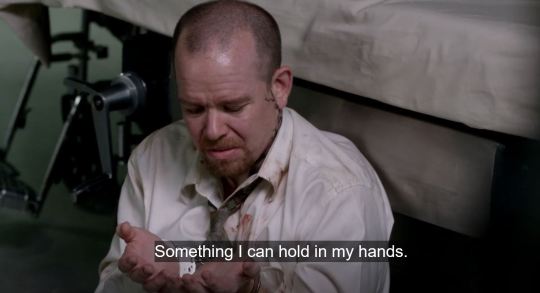
Poor Guy handcuffed by Sam is very tender, he doesn't even ask to be freed: he wants something REAL, something to hold in his hands. Look at that gesture! I feel so sorry for him. He's the episode's established prey. I wonder who are the others (spoiler: Cas and Amara)?
Poor Guy asks for a pudding and tells Sam he's just taking his "sweet time" while he should "eat a bullet". Food here is very much related to death and, right on time, Billie the Reaper enters the stage.
Bille's first appearance is via her hand's shadow while she's singing this song:
O death, o death, o death won't you spare me over another year? Oh, what is this that I can't see with ice-cold hands taking hold of me? When God is gone and the devil takes hold who'll have mercy on your soul?
And then we get this beautiful shot (this is the shadow of Billie's right hand taking the guy left's hand):
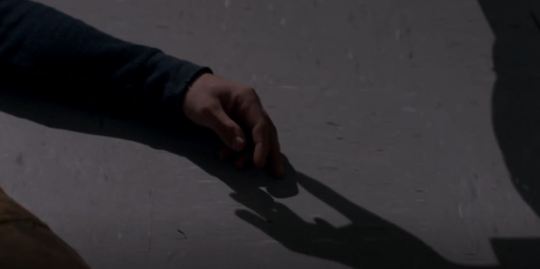
Poor Guy wants to hold something in his hands while Death, with her ice-cold hands, is taking hold of people. Oh, poor guy, Poor Guy!
Sam is then handed a recycled version of s9 Dean's praying in the chapel but nobody comes for him (it's maybe for the better lol). He literally needs to save himself using Billie's suggestion (I love Bille, she's such an ambiguous character, she claims she wants him dead and then she helps him, same happens for Dean, I swear I wanted to know more about her):
So . . . I know it's been a long time, but . . . Dean and I, we've -- we've been through a lot of bad. But this is different. This is my fault, and I don't know how to fix it. And if I have to die, I've made my peace with that, but . . . Please. Dean deserves better. Dean deserves a life. There are people out there, good people, who are going to suffer because of me, and I am not asking you to clean up my mess. Hell, I don't even know if you're out there, but . . . If you are . . . And if you can hear me, I, um . . . We need your help, God. We need to know there's hope. We need a sign.
As I've stated before, Sam is asking for names which is a way to anchor reality by defining it in order to be able to keep on living. In other words, to find a sign that gives meaning to what's happening. But nobody replied when he asked for people's names and God won't reply either.
So what do we know about Sam? He's the hunter hunting for preys to save. He's devoid of meaning and nobody is willing to give it to him. He needs to give himself meaning. His form is decaying since he's dying. He's also becoming Abel and this is NOT a good sign because it means that he'll become Lucifer's prey. Sam's very much Amara's opposite: while she's growing, he's dying; he's asking for help and meaning but nobody is there to help him while Amara asks to be fed and she finds people (Jenna, Crowley) who are willing to provide for her. However, they have one thing in common: they both know one thing or two about cages.
We Need To Talk About Cas.
While Sam asked for a sign, Cas asked for help. However, he got something. What, you ask? A hand-me-down from S9, just like Sam and the chapel scene (LOL). Cas, like Dean in s9, desperately and stupidly asks ANGELS for help. Of course angels always come when they hear prayers to them, it's just that they usually come to scam people and so Cas gets scammed.
Angels are on a hunt to find the Winchesters and they're using Cas as a smear of blood on their trail. He gets abducted, restrained and handcuffed just like Poor Guy:
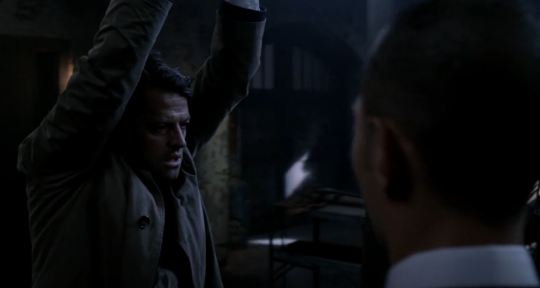
Castiel hanging like red meat.
Cas, again desperately and stupidly, asks for mercy in the name of brotherhood to which Ephram the angel is like: sir, this is a Wendy Heaven.
CASTIEL: Mercy, brother, please! EFRAM: Brother? Ha! What are you? CASTIEL: W-what? I'm an angel of the Lord. EFRAM: That so? 'Cause, near as I can tell, when you have to choose between heaven and the Winchesters . . . JONAH: You choose them. EFRAM: Every time. So, see, you're not my brother. And if I had it my way, I'd take this blade, stick it in your heart . . . and call that a damn good day.
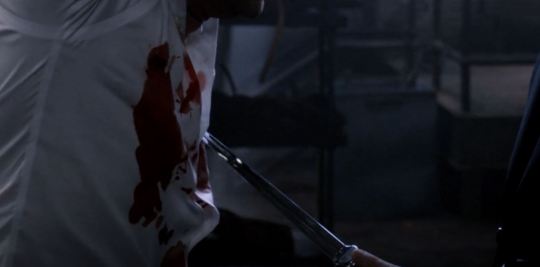
Angels are very interested is some of Castiel's parts.
I think this is an important image. We know Castiel's got too much heart etc. so methinks it's suspish that angels are so concerned with Cas' heart... why do they wanna stick their blade in there? (this sounds awful but I'm proud of it LOL), what's inside these damn hearts of these damn characters that we can't know?! Sometimes storytelling must be bold and Supernatural, when it comes to the heart, rarely is. It's a real shame.
Anyway, here comes Hanna: they act like Gadreel coming to Dean when called to save Sam but they're the wolf in disguise. Hannah is Gadreel is the preacher/hunter from "The Night of the Hunter" is... Crowley.
Yes, look at these following shots:
Crowley putting lots of sugar in his tea with his right hand:

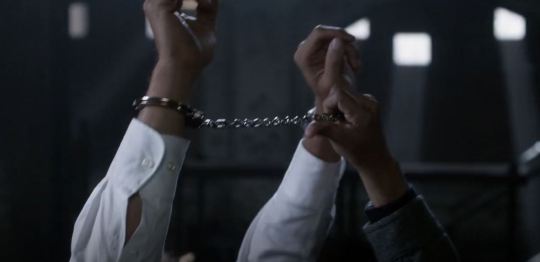
Crowley puts sugar in his tea. It's a shocking news for me.
Hannah single-handedly (with their right hand) freeing Cas from the ropes.
Now we've seen how the right hand is NOT the hand of love so we know now that Hannah, just like Crowley, is pretending, they're not there to help, they're on a hunt.
As per usual, Cas kills all of his "brothers" and saves himself just like Sam. Nobody's there for these characters (Big Sad Face).
So how is Cas compared to "Form and Void" Amara? Well, in his case things are a little different. Amara is referred to as "a little angel" by Jenna's grandma while Crowley refers to Cas as "the idiot angel". Cas himself states that he is angel in front of his brothers.
Plot twist: Amara's got the devil inside ("The devil's in that girl!").
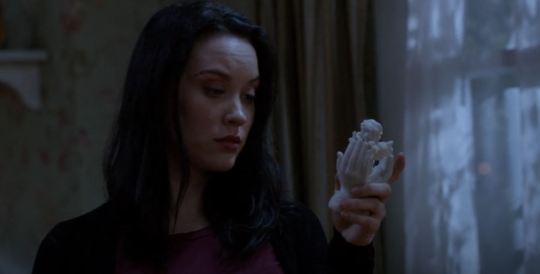
Soulless Jenna smashes angels' statues + that thingy that resembles a lot Poor Guy's open hands.
Plot twist 2! If both Amara and Cas are "angels" and now Amara's got the "devil inside" does that mean...? Yeah it does. Dabb literally told us Cas will be Lucifer's vessel in this episode and I hate it that he was so clever and smooth about it. Grrrr. It's such goood storytelling why is he writing it? Lol. Lucifer bearing the key to Amara's cage, Cas ending up in Lucifer's cage and setting him free... Is, perhaps, one might humbly asks, Castiel the key to someone connected with Amara? The Lucifer/Amara/Castiel of it all is absolutely beautiful. I L-O-V-E it.
The final blow. Sam and Dean are back to the bunker, we see the pile of books from S10's ending and the light illuminates just parts of a book's title.

I need to know the bunker's novels section.
The screenshot, as per my usual, is shitty but the very last book on the pile reads "Sec.....of the Heart" by Cynthia F..."
And then, boom, we find Cas on the other side of the pile. I told you that there is a secret in this episode and the secret is that between Form and Void there's something and this something is the heart of...? Of course we know it's Dean's.
#supernatural#spn#castiel#sam winchester#dean winchester#spn meta#crowley#spn s11#casifer#form and void#movies in spn
13 notes
·
View notes
Text
Paradise Lost, Book 2 (Non-Zoot Edition): Sin Addresses Satan; Satan Allies with Chaos
<- Part 2 || Back to the Beginning || Part 4 ->
I'm not zooted for this one, I just want to talk about it.
Keep in mind this is flow-of-consciousness, so I write down exactly what I think, and then later I sometimes discover i am wrong roflll
“O Father, what intends thy hand,” she cried, Against thy only Son? What fury O Son, Possesses thee to bend that mortal Dart Against thy Father’s head? And know’st for whom; For him who sits above and laughs the while At thee ordain’d his drudge, to execute What e’er his wrath, which he calls Justice, bids, His wrath which one day will destroy ye both.”
“To execute/what e’er his wrath, which he calls Justice” is a metal line and she IS NOT LYING
I am continually struck by how all of these characters have not only acknowledged that God cannot be defeated, they’ve always known God couldn’t be defeated. They still fought him anyway. If I were reading this in a less fantastic setting, I would be like: “M-hmm I feel like a few important documents are missing.”
Another interesting trait: all of these characters know the future. Sometimes it’s awkward—for example, they spend most of Book 2 trying to figure out what to do after falling from heaven, then wax eloquent about events that haven’t happened yet.
It’s hard to know how much was intentional here, and how much was just done in the spirit of the thing, but you know that saying: “With the Lord a day is like a thousand years, and a thousand years are like a day”? (2 Peter 3:8) It’s like these characters are not only devil-and-angel at once, but also every form of themselves from beginning to end. They haven’t yet committed horrors on the human race, but they also have. (This is not free will.)
This book makes constant asides as to God’s greatness. Everybody stops to talk him up—and by “everybody,” I mean “every single devil who gets a speech.” We haven’t had a single “good guy” yet: the only glory given to God that has been from a non-devil is Milton himself. While speaking of God, the devils’ tones rarely feel sullen or angry; instead, they feel very rote and matter-of-fact, as though they’re reading lines out of an encyclopedia. This is just the way the world is, and all the characters accept what is natural.
That’s dissonant on multiple levels. First, these devils literally JUST tried to overthrow Heaven (aka the ideal version of the world, the world-as-it-should-be). Second, given how absolutely broken the devils sound when they give their speeches—the ways they attempt to soothe themselves and comprehend their failure, added to their sudden comprehension of time (did eternity need to be invoked in heaven or Paradise until the birth of pain?)—these acknowledgments of God’s superiority ring false, like another scribe popped in and wrote BUT DON’T WORRY—
I’m trying to figure out Milton’s motivations here. Did he want to reassure the reader, the publisher, a religious authority, or himself? Keep in mind this was published back in a day where “freedom of expression” was not a thing.
By invoking the importance of the monarchy over and over, this may be Milton's attempt to say: "Mr. King sir, this is not supposed to be a story about your overthrow. Please do not kill me."
I’ve also started wondering about the political realities of when this was published. This feels extremely Protestant. Hey Wikipedia whaddaya say
[Milton scholar John] Leonard speculates that the English Civil War interrupted Milton's earliest attempts to start his “epic [poem] that would encompass all space and time”.
YEAH THERE IT IS
This book was published in 1667… by Peter Parker. Aw yeah :) With great power comes great abuse :))))
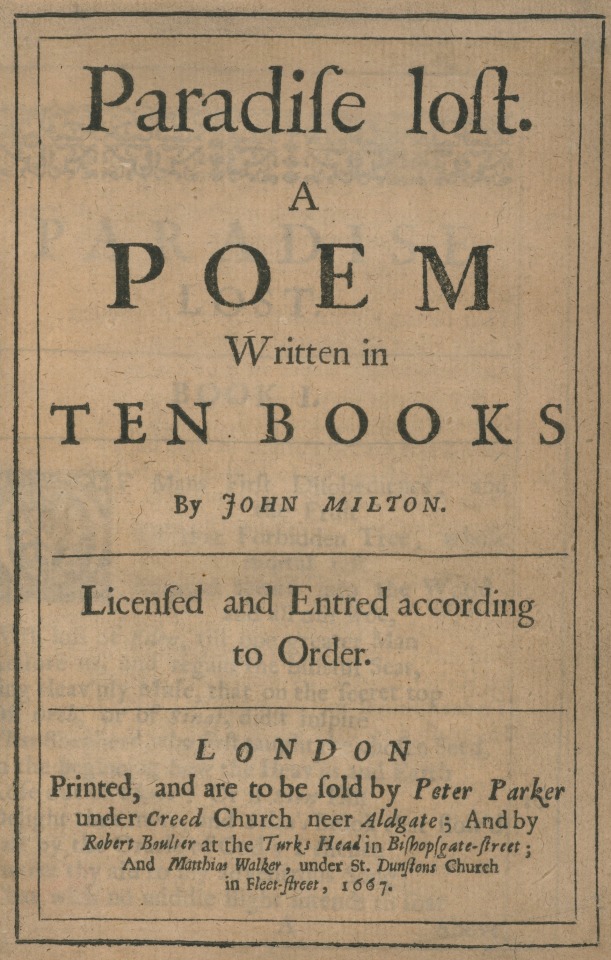
I also didn’t know Milton was freaking blind! You know, that fits; the story’s rhythm begs to be read out loud. I love the imagery that painters came up with: Milton dictating Paradise Lost to his daughters. I don’t know that this actually happened, but it’s kinda cool. Sounds like a callback to Homer so I’m a little wary—you know how people are.
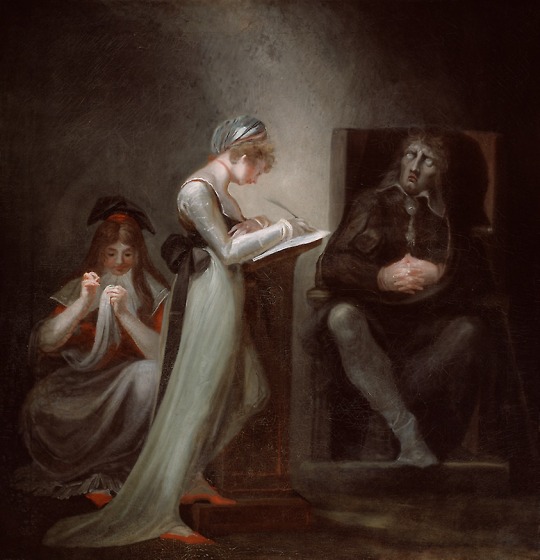
Milton Dictating to His Daughter, Henry Fuseli (1794)
I bet this is exactly how he looked too.

HEEEGUUUGGHRRRHHHHH
Also, I just discovered that CS Lewis wrote a preface to Paradise Lost. I adored him as a child. I’m definitely reading that at some point.
Anyway, want to go back to reading Paradise Lost? I DO. Remember where we were? The snake-assed lady whose vagine is a Cerberi doghouse? Well, the devil asks who she and this Dart-wielding shade are…
Without research, I’m guessing the “dart” is a spear. The other option is an arrow, which sounds significantly less dangerous, and no bow is mentioned. I mean, you can still stab someone to death with an arrow, it just seems kinda silly. It’s like running at someone and jamming a bullet into their eye.
Of course, it may be meant to be an arrow. There’s a famous image in Revelations I can’t stop thinking about: the white horseman (commonly interpreted as Jesus—Revelation 6:2) comes out with a bow, but no arrows or quiver.
Holy shit, if you put Jesus and Death together you get a bow and an arrow and the arrow is death
I’m just kidding please ignore everything I say
[The devil asks: who the fuck are you guys and why are you calling me father?] T’ whom thus the Portress of Hell Gate reply’d: “Hast thou forgot me then, and do I seem Now in thine eye so foul, once deem’d so fair In Heav’n, when at th’ Assembly, and in sight Of all the Seraphim with thee combin’d In bold conspiracy against Heav’n’s King, All on a sudden miserable pain Surpris’d thee, dim thine eyes, and dizzy swum In darkness, while thy head flames thick and fast Threw forth, ’til on the left side op’ning wide, Likest to thee in shape and count’nance bright, Then shining heav’nly fair, a Goddess arm’d Out of thy head I sprung: amazement seiz’d All th’ Host of Heav’n; back they recoil’d afraid At first, and call’d me Sin, and for a Sign Portentous held me…
Suddenly, allegory!
I’ve been researching allegory lately—not well, and piecemeal—but I’ve been interested in its function, as well as what makes a good allegory and what makes a bad one. Now, before this point, I would have said that an allegory encloses the entire narrative, not just a part of it. But here we have traditional characters (Satan, Beelzebub, etc), all of whom Milton intended as representations of real spiritual beings, and all of a sudden: the allegorical representations of Sin and Death. They are not just characters, they are concepts—and yet I’d say they belong here. I feel like I can almost put a finger on why…
Was Milton a Biblical literalist? I really don’t know. There are most likely cultural and historical differences I’m missing here. I’m sure that, if Milton were a literalist, it would not be like that of the evangelicals we see today. Evangelical literalism is a particularly stupid, flat kind, and I’m not sure it was that simple back in 1660s England.
Another neat little factoid: a lot of Paradise Lost heralds back to the epic poetry of the Greeks and Romans, right? Who else sprang fully-formed from a forehead? Athena from Zeus! So this is a great callback and recontextualizing of an old myth, setting Lucifer on par with The Rapist King.
One big theme of Book 1’s was that all the other gods of the world are demons—every one of them. So Sin popping out, appearing godlike—for a moment, just like Satan himself—is a hell of a backslap. Athena was a virgin god of wisdom. You’re about to see what happens to Sin (hint: she’s a ho)
I suppose it is also possible that this is an attempt of Milton’s to represent an evolution of theology. Speaking of CS Lewis: Lewis believed that all Classical myth was composed of spiritual half-truths—like the ancient pagan faiths of the improperly-godded Classical peoples were reaching for that absolute truth of Christ, and were unable to because he hadn’t been born yet. According to Lewis, all these old faiths would ultimately be brought together under the umbrella of the Christian God’s single one. It’s one reason why Chronicles of Narnia is full of mythological beasts particular to the Greeks and Romans.
What do you mean, “what about the Jews? Weren’t the Jews around in ancient Rome? And at the time of ancient Greece for that matter?” Girl I don’t remember it’s been a minute and this is just me talking shit into the ether and I’m not even zooted right now
“…but familiar grown, I pleas’d, and with attractive graces won The most averse, thee chiefly, who full oft Thyself in me thy perfect image viewing Becam’st enamour’d, and such joy thou took’st With me in secret, that my womb conceiv’d A growing burden.
“Proshippers DNI/Sinatan shippers DNI”
Can we please appreciate “my womb conceiv’d/a growing burden.” That’s so pretty.
“Meanwhile War arose, And fields were fought in Heav’n; wherein remain’d (For what could else) to our Almighty Foe Clear Victory, to our part loss and rout Through all the Empyrean…
Back to the devil and his minions throwing in little asides about how great God is. Does this feel weird to you, too? It’s disingenuous. Every time you’re just about to accept the demons and hell-born as characters with full interior worlds, they give up on themselves. Characters should be selfish, self-oriented, self-protective. These characters keep stopping to bare their throats.
So why did these demons turn against God if they knew they were going to fail?
I mention this because Paradise Lost waffles about “free will” a lot. At first, I thought the devil mentioned “free choice” because “choice” was an inherently fallen concept, but then I remembered that Adam has a whole conversation with an angel and “free will” is uttered as a benefit.
Here’s a fun verse—one of many, they’re everywhere—that Milton was probably trying to invoke:
The Lord has made everything for its own purpose, even the wicked for the day of evil. Proverbs 16:4
That’s very cool. thanks God. Hey free will isn’t free if you brutally punish anyone who sticks a toe out of your arbitrary line you fucking asshole
“…down they fell Driv’n headlong from the Pitch of Heaven, down Into this Deep…
If you repeat this line out loud, it will heal you of all wounds. How do poets talk about this shit properly? I don’t have the language to describe why it’s good. It hurts, it’s so tasty. I started salivating like this was a delicious cookie. That delicious alliteration. Those hard d’s. HEA(D)long, then HEA(V)en. Soft f’s (fell, from). “Driv’n”, then “Heaven.” “Down” repeated twice, both times beginning a phrase. Long phrase, short phrase—the long fall, the hard stop; hard “d” to soft “v.” You can feel the drop.
I don’t know how to explain this so say it out loud ok
“…and in the general fall I also; at which time this powerful Key Into my hand was giv’n, with charge to keep These Gates for ever shut, which none can pass Without my op’ning.”
A woman who is also an opening. That’s really neat. Oh shit Jesus knocks down the gates of hell, right? Does this imply yet more rape or… yeeeeahhhhhh
Again, I’m struck by how the wicked are the tools of God as soon as the angels are. Why does Sin have to keep this key? What stops her from tossing that shit away? What stops her from opening the gates of Hell and leaving?
The glib answer is, “God does.” However, this wouldn’t be completely fair to say. Allegorical limitations apply here: Sin is not a full character.
Now, as Sin is a concept in this case, it’s like she’s transformed Satan into an allegorical concept by proxy: only by Sin might we allow Satan in. Nice.
It’s like… a tiny allegorical universe for a moment. A wee allegorical nugget.
“Pensive here I sat Alone, but long I sat not, ’til my womb Pregnant by thee, and now excessive grown Prodigious motion felt and rueful throes.
No. No I hate this. Stop
“At last this odious offspring whom thou seest Thine own begotten, breaking violent way Tore through my entrails…
remember Alien? Unfortunate
“…that with fear and pain Distorted, all my nether shape thus grew Transform’d: but he my inbred enemy…
I know we’re very grossed out but can we appreciate this use of the word “inbred” for a moment
“Forth issu’d, brandishing his fatal Dart Made to destroy: I fled, and cri’d out ‘Death’; Hell trembl’d at the hideous Name, and sigh’d From all her Caves, and back resounded ‘Death.’
Remember the “execrable shape” and the “miscreated Front”? I laughed about it, but Milton was being literal: what else could the devil say about Death? Death is a haze without meaningful form. Death can take whatever form he needs to do what he must. And, in this case, Death is greater than his father. He’s an anti-Jesus.
I also love the use of echo. The feeling of resignation and acceptance… just mwah, mwah.
“I fled, but he pursu’d (though more, it seems, Inflam’d with lust than rage) and swifter far, Me overtook—his mother!—all dismayed, And in embraces forcible and foul Engend’ring with me, of that rape begot These yelling Monsters that with ceaseless cry Surround me, as thou sawst, hourly conceiv’d And hourly born…”
Oh no. Oh no no no. Noooooo
So for the record, this is Death repeatedly raping Sin, who then gives birth to dogs on the hour, every hour, for the rest of eternity. Why dogs? Because nobody wants that.
Let’s take a step back from the allegory for a second, because we can. What did Sin do that was wrong? She was literally formed without choice. She had no choice in her nature and she had no choice in what happened to her. It’s debatable she wanted to fuck Satan. It is possible she did nothing but be born and ravished.
Yes I know she’s a concept, but she’s also playing a character here. If you didn’t want me to feel sorry for Sin you shouldn’t have made her a person. Also, the way Sin is being treated is considered an acceptable punishment. The devil characters, who can be treated purely as characters, are being punished by Milton in what he perceives as acceptable ways, and it’s arguable his audience would think similarly.
If God can treat the devils like this, there's no reason he can't treat us like this.
God is a fucking monster y’all. He’s the equivalent of every redneck who fantasizes about killing an Evildoer. Except then he MADE the Evildoer so he could purposely kill them. Worse than that: he made the Evildoer so he could make them suffer.
You ever see someone write so well they fuck up their own propaganda
“…with sorrow infinite To me, for when they list into the womb That bred them they return, and howl and gnaw My bowels, their repast; then burst forth Afresh with conscious terrors vex me ’round, That rest or intermission none I find.
Heeeyyyy are you supposed to feel sorry for Sin?
According to a quote of CS Lewis’ (from Wikipedia. Again, I’m not trying to do a great job here, I’m just fucking around, who even gives a shit), contemporaries of Paradise Lost would have known there were moments they were Supposed to Feel Certain Things, and that the Devil would be considered Bad right away, without any character-building whatsoever.
This is absolutely true. I’m coming to this slow realization that Paradise Lost exhibits traits of both modern narratives—where a character’s quality is SHOWN by their behavior, which includes their dialogue, which may not be trustworthy—and those of allegories, an older literary form. Allegories of the old days were far more straightforward, with characters written to be as one-dimensional and obvious as possible. Nobody wanted to be misunderstood.
However, this is also such a tone-deaf and willfully stupid take that I reject it in part. Look, Lewis was smart, but he would twist himself into a pretzel before he’d admit God could be a fucker: contemporary readers of this book definitely had problems with the devil’s part, and the devil’s complex qualities are part of the book’s draw. I’d argue that the devil is probably the only reason we’re still talking about Paradise Lost today—plenty of good shit was being written back in Milton’s day, and you have to dig to find it. Why did Paradise Lost not fall into a dark pit where only researchers go? It’s not because its first readers decided altogether to read it in a single manner most pleasing.
People are not monoliths guys. Movements are born and slow evolutions turned.
“Before mine eyes in opposition sits Grim Death my Son and foe, who sets them on, And me his Parent would full soon devour For want of other prey, but that he knows His end with mine involv’d; and knows that I Should prove a bitter Morsel, and his bane, When ever that shall be; so Fate pronounc’d.
This is simultaneously horrible, beautiful, and the most metal thing I’ve ever read.
Sin’s longing for cannibalism is the first overt sign of her interior monstrousness (unless she desired the incest, anyway).
This is a reminder to me that to appear ugly or distasteful was often used as a sign in old literature that someone is trash. It’s not a new concept. People confuse personal discomfort with truth all the time.
I am also reminded of the qualities of old allegorical literature. Dialogue wasn’t used to expand on a character’s inner world—it was used like an encyclopedia entry, to deliver clearcut information. The character was not a person, the character was a concept, and nobody was confused about that.
I just had an interesting thought: does Paradise Lost represent a kind of middle ground between older allegorical works and more modern character-driven works?
Wait, if she wishes she could eat Death, why did she stop him from fighting Satan
I mean, Death would win, but… I don’t know. A slave to the narrative? Yeah, probably an allegorical limitation. Allegorical symbols can’t break character or they cease being allegorical. This is one of their major limitations and it’s why writing an allegory that isn’t hamfisted is like scooping your eyes out with hot spoons. I’m starting to see how it’s unwise to just throw a random allegorical character in with a bunch of Normies: first, because they’re limited; they often can’t act like people. Second, what does that say about the rest of the narrative? It opens a can of worms. The artificial limitations of the devils suddenly becomes suspect. The allegory struggles to stretch beyond its tiny nugget prison.
“But thou O Father, I forewarn thee, shun His deadly arrow…”
Oh… ok :(
goofy-ass specter running at the devil with a goddamn arrow
I mean, it’ll work.
“…neither vainly hope To be invulnerable in those bright Arms, Though temper’d heav’nly, for that mortal dint, Save he who reigns above, none can resist.”
Every now and then, you get a hint as to how a word has evolved. Today, we think of “arms” as weaponry; here, Milton uses it to refer to “armor.” As for “dint”, it could go either as “blow, stroke” (the archaic reading, according to my dictionary) or as “force, power.” Also according to my dictionary, this is where “dent” came from (take this with a grain of salt lol).
I don’t know, it’s very cool.
She finish’d, and the subtle Fiend his lore Soon learned, now milder, and thus answer’d smooth.
I love the current-day connotations of the word “lore.” It makes this kind of funny.
Reading on, I’m honestly not sure if he believes Sin or not. You think you’d remembering fucking your brainchild. Then again, this is Hell; the characters exist in a weird between place. It’s possible that in the spirit world, concepts can be people… perhaps the nature of the spiritual is its adherence to the ideal (both ideal Wickedness and Holiness).
What makes this even harder to understand is: where does Milton intend for double-meaning and earnestness to reside? I ask because it was the style of allegories and parables to be rather straight-forward, as Lewis said. But these characters are sometimes almost modern, with clear snark and ulterior motives.
“Dear Daughter, since thou claim’st me for thy Sire, And my fair Son here showst me, the dear pledge Of dalliance had with thee in Heav’n, and joys Then sweet, now sad to mention, through dire change Befall’n us unforeseen, unthought of,
Smooth.
“…know I come no enemy, but to set free From out this dark and dismal house of pain,
Wait a minute. Is this where House of Pain got their name. IS THIS WHERE HOUSE OF PAIN
(I looked it up. It’s from HG Wells’ The Island of Dr. Moreau, which is just as weird.)
“Both him and thee, and all the heav’nly Host Of Spirits that in our just pretenses arm’d Fell with us from on high: from them I go This uncouth errand sole, with lonely steps to tread Th’ unfounded deep, and through the void immense To search with wand’ring quest…
“From there I go—this uncouth errand sole,” is what I’ll say when I’m heading out on errands from now on.
“…a place foretold Should be, and, by concurring signs, ere now Created vast and round, a place of bliss In the Purlieus of Heav’n…
I had to look up a word. “Purlieu” means “the ground on the edges of a forest, especially when partly subject to the same forest laws concerning game hunting, etc” or “the outskirts of any place; an adjacent district; the environs or neighborhood.”
I really like the implication of “at the edge of law.” That’s what God keeps coming down to—that’s what the book keeps coming back to: the battle between law and anarchy.
“…and therein plac’d A race of upstart Creatures…
fuck yeah. fuck you satan
“…to supply Perhaps our vacant room, though more remov’d, Least Heav’n surcharg’d with potent multitude Might hap to move new broiles…
I had to look up “broiles,” and in the process, discovered what may be the best dictionary of all time: Shakespeare’s Words.
“Broil” once meant “turmoil, confused fighting, battle.”
“…be this or aught Then this more secret now design’d, I haste To know, and this once known, shall soon return, And bring ye to the place where Thou and Death Shall dwell at ease…”
This section is so delicious.
First, Satan is schmoozing, 1000%. We only know this because he first talked shit to Death and Sin, and has now changed his tune. That said, it’s wildly unclear what his motivations are, half because he’s talking to literal allegorical figures. Once allegories get involved, they are stringently policed: neither Sin nor Death can be surprising to us. They will exhibit all the traits of their counterparts as understood by Milton’s version of Protestant Christianity. Their purpose is edification and education. An allegory is an encyclopedic entry given flesh.
Second, for what purpose does Satan offer these things? To pay them off? Probably. Does he offer them because he has grown a heart? No, probably not. Is he just offering what these characters want to hear? Probably. But, as you’ll soon see, he’s not lying. Does he know he’s not lying?
“…and up and down unseen Wing silently the buxom Air…
“Buxom” used to mean “lively, cheerful, bright,” not BIG OL TITTIES
“…embalm’d With odors; there ye shall be fed and fill’d Immeasurably, all things shall be your prey.”
We know, because we are inundated with Christianity in this country, that he’s telling the truth. He’s explaining that once Sin and Death are free, they’ll be free to feed on the Earth.
Is he telling what he perceives as truth, or is he promising pie in the sky?
If we were to be blitheringly flat, like Lewis, we’d recognize Satan’s speech as literal: he’s offering a promise he can keep; he understands what is going to happen before it ever happens. But because he’s complex, and started off his speech with flattery, I’m also not completely sure—I can only know by reading on and finding out if he spoke the truth.
Of equal interest: Satan is also doing right by his baby mama and weird fucking son. Sure, he’s talking shit, but he’s also taking responsibility.
Just. Kinda weird situation all told.
He ceas’d, for both seem’d highly pleas’d, and Death Grinn’d horrible a ghastly smile, to hear His famine should be fill’d, and blest his maw Destin’d to that good hour…
God I love this description. I love how Death contains “famine”, how he blesses his empty throat with promises of glut.
…no less rejoic’d His mother bad, and thus bespake her Sire. “The key of this infernal Pit by due, And by command of Heav’n’s all-powerful King I keep, by him forbidden to unlock These Adamantine Gates; against all force Death ready stands to interpose his dart, Fearless to be o’ermatched by living might.
One guy with one arrow versus everybody.
It’s all right, tell me how it goes
“But what owe I to his commands above Who hates me, and hath hither thrust me down Into this gloom of Tartarus profound, To sit in hateful Office here confin’d, Inhabitant of Heav’n, and heav’nly-born, Here in perpetual agony and pain, With terrors and with clamors compass’d round Of mine own brood, that on my bowels feed…
OH MY GOD SHE’S DOING IT
FIGHT FIGHT FIGHT
On that note: are you saying. That if God had maybe. Not been incredibly cruel to Sin. We may not have had Sin
Lewis would say something about how Sin had made her choice, and about how the brutalities wreaked against her were her own fault somehow, and that her nature was inherently wicked, so she would be wicked even when shown mercy. Then he'd end up with "it's an allegory anyway"
The problem with this is a) Christianity is about forgiving people who have committed some real humdingers, so this is logically dissonant, and b) so far, God hasn’t just punished: he has been nasty and cruel. The only love I have seen is between devils. If this is propaganda for God it’s not doing a very good job
“Thou art my Father, thou my Author, thou My being gav’st me; whom should I obey But thee, whom follow? Thou wilt bring me soon To that new world of light and bliss, among The Gods who live at ease, where I shall Reign At thy right hand voluptuous, as beseems Thy daughter and thy darling, without end.”
YES
Kinda weird but YES
Don’t take shit from that asshole lady he sucks
Thus saying, from her side the fatal Key, Sad instrument of all our woe, she took; And towards the Gate rolling her bestial train, Forthwith the huge Portcullis high up drew, Which but her self not all the Stygian powers Could once have moved… …So wide they stood, and like a Furnace mouth Cast forth redounding smoke and ruddy flame.
I just wanted to share this for the imagery. I love the imagery of a beautiful woman on a serpent’s tail, slipping slimy and bloody over the black earth, her body broken open in a hundred places where her hungry young have burst forth, and all around her the hellhounds loping. Then you can just feel the gates of Hell open and all I can think of is how I feel when I open the front door on a haboob.
“Redound” means “to fall out, contribute, turn out.”
Before their eyes in sudden view appear The secrets of the hoary deep, a dark Illimitable Ocean without bound, Without dimension, where length, breadth, and height, And time and place are lost; where eldest Night And Chaos, Ancestors of Nature, hold Eternal Anarchy, amidst the noise Of endless wars and by confusion stand.
Most of what I’m sharing here, I just LIKE. I like the image of Chaos and void. I love how it dwarfs Lucifer. I can feel the wind surging from that hot black egress. It probably switches back on itself—in direction, in temperature, in violence.
Also, I can't stop remembering that weird starlit void lurking below the surface world of Elden Ring.
...Into this wild Abyss, The Womb of nature and perhaps her Grave, Of neither Sea, nor Shore, nor Air, nor Fire, But all these in their pregnant causes mix’d Confus’dly, and which thus must ever fight, Unless th’ Almighty Maker them ordain His dark materials to create more Worlds, Into this wild Abyss the wary fiend Stood on the brink of Hell and look’d a while, Pondering his Voyage; for no narrow frith He had to cross.
“Frith” is an ancient word for “estuary.”
His Dark Materials is a book series. That phrase and the title of The Golden Compass originate from Paradise Lost. Speaking of which, I need to finish the series. From what I’ve read, the author had a bone to pick with CS Lewis, and I do approve of that.
Again, I love the imagery of this section, and that’s the only reason I’m sharing this. See, so far, Satan has been presented as a giant. He’s enormous. He’s powerful. But the chaos dwarfs him. Could absolutely swallow him. You believe in it as a dangerous place—a primordial place. It feels older than God.
Although the void here is technically allegorical, there’s worldbuilding here. This is an attempt at realism. The boundaries between allegorical and literal smear.
…At last his Sail-broad Vans He spreads for flight, and in the surging smoke Uplifted spurns the ground, thence many a League As in a cloudy Chair ascending rides Audacious, but that seat soon failing, meets A vast vacuity: all unawares Flutt’ring his pennons vain plumb down he drops Ten thousand fathom deep…
I had no idea that “vans” originated as a word for “wings.” For a brief, heady moment, I imagined Lucifer taking off in some cool fuckin kicks.
Here's where you see what I mean about action sequences: Milton is so damn good at making you feel the rough weather and envisioning weird spaces. "Surging smoke," "ascending rides/Audacious," "a vast vacuity."
...i love alliteration and action verbs. so much
…when straight behold the Throne Of Chaos, and his dark Pavilion spread Wide on the wasteful Deep; with him Enthron’d Sat Sable-vested Night, eldest of things, The consort of his Reign; and by them stood Orcus and Ades, and the dreaded name Of Demogorgon; Rumor next and Chance, And Tumult and Confusion all embroil’d, And Discord with a thousand various mouths.
Again, I just LOVE this. I’m trying to only share things I enjoy, but it’s so hard when the whole book sings.
"Wide on the wasteful deep." Mmmmfffffff f f f ffffffffffffff
"Sable-vested Night." You know, when people adjectivize nouns, usually I get mad, but this is gorgeous.
Had to include the bit about Discord because never before have I appreciated the name so well
“Yours be th’ advantage all, mine the revenge.”
Metal. Take whatever you want: I wanna fuck this guy over. (Satan absolutely said this.)
...Satan stay’d not to reply, But glad that now his Sea should find a shore, With fresh alacrity and force renew’d Springs upward like a Pyramid of fire Into the wild expanse…
One thing I like to imagine, especially when I see visual depictions of spectacular events, is wonder how the author came to envision them. As writers, we’re very lucky in this day and age that we can go look up videos and images and firsthand accounts of farflung events, and a lot of us take cues from film and television. Milton would have had a more limited palette.
What is more, not everyone can write an action sequence. Milton can. He understands that language is about feeling, not seeing.
It makes me wonder: what inspired the image of Satan’s launch? Fireworks? Comets? Lightning? The mere interplay with light out in the world?
“Glad now his Sea should find a shore” is a beautiful line and it’s about the devil allying with Chaos rofl
Send that one to your lover one day without explanation.
But now at last the sacred influence Of light appears, and from the walls of Heav’n Shoots far into the bosom of dim Night A glimmering dawn…
The sun is heaven confirmed
We're all gonna live in the sun someday
Oh wait I'm writing this.....
...im going to hell.......
…Satan with less toil, and now with ease Wafts on the calmer wave by dubious light And like a weather-beaten Vessel holds Gladly the Port, though Shrouds and Tackle torn; Or in the emptier waste, resembling Air, Weighs his spread wings, at leisure to behold Far off th’ Empyreal Heav’n, extended wide In circuit, undetermin’d square or round…
It’s fascinating to me that Heaven is seen right away as bending the laws of physics. A different writer whose name rhymes with "HP Lovecraft" would be like NON-EUCLIDEAN GEOMETRY
With Opal Tow’rs and Battlements adorn’d Of living Sapphire, once his native Seat; And fast by hanging in a golden Chain This pendant world, in bigness as a Star Of smallest Magnitude close by the Moon.
“This pendant world” "living Sapphire" UggghhhhHHH it’s so good
Imagine for a second: the peoples of this era already knew the Earth was round, but nobody had seen it from space yet.
Milton could fully envision it—like a jewel hanging in the sky.
What I don’t understand is “the golden chain.” It may be literal lol
Thither full fraught with mischievous revenge, Accurst, and in a cursed hour he hies.
This is a word-by-word account of my green-cheek conure flying into a plate of mashed potatoes.
To Be Continued
16 notes
·
View notes
Note
Describe Hekate as a person? From what I can guess she seems like a stern but reliable "parent" that wants you to understand the tools or lessons they give so that you don't second guess yourself. Generally, I love these types of personalities since it makes me want to strive forward either for them or because they make learning worthwhile.
I don't know if I could describe Hekate as a person... Because she isn't one. Quite literally, I mean.
She is a vast, multi-faceted, transcendental power and force of nature, whom we can experience through many different guises. Her most popular guise is indeed that of the stern, cunning yet nonetheless caring witch goddess. But I think that is more to do with the qualities people prefer to call upon when they invoke her, rather than being indicative of Hekate's true nature.
One should never mistake one's perceptions of a being, for the being itself. Whatever visions or knowledge we receive from a deity is more about what they are trying to tell us, and how they have decided to express that teaching.
I think that if you call to Hekate as a compassionate mother, she is more than capable of answering with overwhelming love and gentleness. If you call to her as a wise and benevolent mentor, she'll answer as that. And if you call upon her as a fearsome bringer of destruction, she will not necessarily protect you from your own actions. Of course, there's every chance that she'll decide to respond differently, because as vast as Hekate is, she also has her own will and agency.
(See here for a long list of Hekate's epithets)
One of the things people discover when they do extensive cultivation, de-conditioning and work on the Self, is that the Self is very malleable and endlessly faceted. From this work, the personality begins to loosen up a lot, and the rigid lines we draw between our identity, other people, and our environment, gets very blurry. If you go deep enough with this kind of work, the distinction between Self and Other become meaningless (i.e. enlightenment). If that can be experienced by a human, well... what about gods, when they're much older and not even confined by a physical body like we are?
When I describe my interactions with Hekate, it is interpreted through the witch goddess lens because that's how I invoke her all the time. When I hear her speak, it is in a very straightforward, pragmatic, and sometimes sarcastic way. But the person who taught me all about her is also straightforward, pragmatic and very often sarcastic.
And to be honest, when you describe a torch-bearing nocturnal goddess followed by dogs, ghosts and monsters, whose hair is entwined with serpents and oak leaves... People are inevitably going to imagine her in a certain way, right? But these things are symbolic of Hekate's power; they will draw certain kinds of people to her, but they are not necessarily indicative of her personality. And it does not mean that those things are the only expressions of her power.
The gods and spirits speak to us through our own thoughts. It is very common for them to use our memories, experiences and imaginations in order to communicate with us. That is why, by the way, one of the best things you can do in your practice is to regularly seek novel experiences.
The other thing to know is that Hekate has a host of nocturnal nymphs who act as her representatives in the world. These are the Lampads – torch-bearing infernal nymphs associated with the local land. They provide inspiration and guidance to Hekate's followers and act in her stead, and they will take the voice and form of Hekate when standing in for her. So there is every chance that a message or teaching received from Hekate was delivered through her Lampads.
When trying to understand Hekate – given that she is all about transcending boundaries, and that her most popular depiction is of three goddesses standing together – probably the worst thing you can do is try to define her.
However, if Hekate inspires in you the desire to go beyond, evolve, learn, grow, and transcend your limits over and over. That is Hekate. That is exactly what will help you resonate with her.
Thank you for your question :)
16 notes
·
View notes